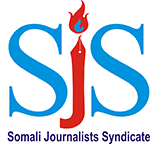Somali Journalists Syndicate (SJS) is an independent journalists’ trade union established in May 2019 by professional journalists to defend rights of working journalists, advocate for press freedom and provide legal aid. SJS is a member of Congress of African Journalists (CAJ) and CIVICUS,the global coalition of civil society organisations. Tel: +252 1 857551

